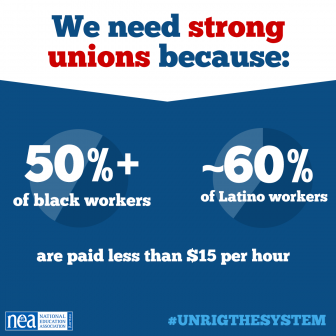Maysville Schools’ Support Professionals Vote to Unionize, Join OEA

(Dec. 18, 2018) | For Immediate Release | Contact: Gabriel Weatherspoon Jr. | 740 624-3905
Confirmed by an official ballot count by the State Employment Relations Board, nearly 100 nonunion education support professionals of the Maysville Local School District voted to become an affiliate of the Ohio Education Association (OEA). The Maysville Local School District is located in Muskingum County, near Zanesville.
These education support professionals, which include school bus drivers, custodians, aides, paraprofessionals, secretaries, as well as food service workers will be collectively known as the Maysville Classified Employees Association (MCEA).
“Our primary reason for organizing is to secure fair working standards across the district,” said MCEA spokesperson Gabriel Weatherspoon.
“Regardless of position or title, we ALL deserve to be heard at work and be treated with dignity.”
Emphasizing the role that everyone has in maintaining a safe and robust learning environment for Maysville students, Weatherspoon added: “Regardless of position or title, we ALL deserve to be heard at work and be treated with dignity.”
Similarly, since 1991, the OEA has represented the professional interest of the school district’s approximately 140 teachers and similar certified staff members as the Maysville Education Association.
Today’s vote was the culmination of a months-long organizing campaign.
The Maysville Classified Education Association will now begin the process of negotiating its initial contract with the Maysville Local School Board
“We are looking forward to sitting down with the district and discussing a fair and equitable contract that benefits not only the Maysville classified staff, but also the students we work with every day,” said MCEA Organizing Chair Tammy Smith
![]()
Pictured Below: The Newly Formed Maysville Classified Education Association
• Front, l-r: Mitzi Farmer; Trisha Winland; & Melissa Spring.
• Back: l-r: Robin Windsor; Barb Handshy; Tammy Smith, Organizing Chair; Gabe Weatherspoon, MCEA spokesperson; & Beth McGee

![]()
Ohio Education Association Strongly Endorses Issue 1
 At its September 15, 2018, meeting, the Ohio Education Association Board of Directors voted unanimously to endorse Issue 1 on the 2018 November ballot.
At its September 15, 2018, meeting, the Ohio Education Association Board of Directors voted unanimously to endorse Issue 1 on the 2018 November ballot.
The Neighborhood Safety and Drug Treatment Amendment reduces the number of people in state prison for low-level, nonviolent crimes and puts the money to better use by directing future savings to drug treatment and victim services.
“As educators, we see the terrible impact of the opioid epidemic on our communities and the families of our students…too often, the resources for treatment are not there.”
— Pres. Becky Higgins
→ Issue 1: Frequently Asked Questions
“We believe that Issue 1 helps to address the urgent need to fix Ohio’s broken and overcrowded prison system that puts in jail non-violent offenders at the expense of adequately funding prevention and treatment programs,” said OEA President Becky Higgins.
Issue 1 would not change laws or funding for incarcerating people convicted of serious crimes such as murder, rape, and child molestation. A broad, bipartisan coalition of community, faith, law enforcement, and business groups has formed to support this measure and help Ohio improve safety and reduce prison costs.
Ohio’s 2018 District Report Cards Incomplete, Misleading
Columbus, OH — September 13, 2018 | The Ohio Department of Education (ODE) has released its 2018 Ohio School District Report Cards; but, the more than 600+ district reports cards are misleading.
“Missing are the critical elements that thoroughly evaluate a district’s performance,” said Becky Higgins, president of the Ohio Education Association.
“Unfortunately, as an evaluation of student readiness and academic achievement levels, unfortunately, this tool is too simplistic.”
Higgins added, “socioeconomic factors remain a consistent and reliable predictor of an array educational outcomes…. Unfortunately, as an evaluation of student readiness and academic achievement levels, this tool is too simplistic.”
Accordingly, the OEA continues to urge the General Assembly to pass the proposed report card reforms contained in House Bill 591 (Rep. Mike Duffey—R).
“Reforms include ending the arbitrary districtwide letter grades and replacing them with different, but more realistic performance indicators,” emphasized Higgins.
Additional proposals would also address the misguided state takeover of local school districts that result from the effects of systemic poverty.
Referencing the ODE’s Each Child Our Future, Higgins says the document’s three core principles acknowledge the correlation is real. In its review of Ohio’s educational environment, the strategic plan argues:
1. job categories are changing and require new skill sets;
2. the student body has become a more diverse, with nuanced learning needs; and,
3. increased student exposure to poverty and other adverse childhood experiences.
“Numerous studies continue to support the same,” says Higgins. “Moreover, the current letter-grade system as well as state takeover measures do not help educators to address these barriers,” said Higgins.
![]()
The Ohio Education Association represents 125,000 teachers, faculty members and support professionals in Ohio’s public schools, colleges and universities.
OEA Applauds Cordray’s Education Plan
 (September 12, 2018—Columbus) – Today, Richard Cordray announced his plan, Supporting Ohio’s Students. The plan was applauded by Becky Higgins, president of the Ohio Education Association.
(September 12, 2018—Columbus) – Today, Richard Cordray announced his plan, Supporting Ohio’s Students. The plan was applauded by Becky Higgins, president of the Ohio Education Association.
“We believe Rich Cordray has a student-centered agenda that makes public education a top priority. He has an impressive understanding of the key education issues Ohio’s next Governor will face — from the need to invest in support services, ending the reliance on high-stakes, standardized tests, to reining in poorly performing charter schools.”
“We believe Richard Cordray has the leadership skills and commitment to students needed to address the many challenges our state will face in the years ahead,” said Higgins. “He is the right choice for Ohio’s next Governor.”
Related: Campaign 2018 — OEA Endorsed Candidates
![]()
The Ohio Education Association represents 125,000 teachers, faculty members and support professionals in Ohio’s public schools, colleges and universities.
OEA: Should We Believe What DeWine Says About Education or What He’s Actually Done?
Gubernatorial candidate Mike Dewine outlines his flawed education plan
“We welcome some of the good ideas on education offered today by gubernatorial candidate Mike DeWine – ideas with which we agree, such as reducing standardized testing and getting more state funding into our schools,” said Ohio Education Association President Becky Higgins.
As a member of Congress, he voted was voting against funding programs that would have benefited Ohio’s public schools! …. Where was DeWine to rein in ECOT?
“But, unfortunately, his record tells another story. As a member of Congress, he voted against funding programs that would have benefited Ohio’s public schools. In addition, his call for more accountability for Ohio’s e-schools begs the question of where he’s been all these years when he could have done something to rein in the abuses of the state’s most notorious e-school, ECOT.”
We think a better bet for ensuring that every student and educator in Ohio has the resources and support they need to succeed is to vote for Richard Cordray for Governor.”
![]()
Related Items
• Countdown to Campaign 2018 — OEA Endorsed Candidates
• Ohio Education Association Endorses Richard Cordray for Governor
• 08.06.2018 Columbus Dispatch: Under fire for ECOT, DeWine wants to reduce student testing in Ohio schools and establish a pay-for-performance mode
![]()
OEA Opposes Proposal of Federal Funds to Buy Guns for Educators
U.S . Education Secretary Betsy DeVos Proposing Title IV-A Funds be Used to Arm Teachers
The Following Can be Attributed to OEA President Becky Higgins:
“The idea of arming teachers is simply a bad idea. It does not make our schools and our students safer.
The suggestion that Title IV-A funds, which are meant to be used for mental health, bullying prevention, and other programs would be used to put guns into our classrooms is unacceptable.
It reflects the misplaced values of this administration. If we use the funds for what they were intended to be used for, we might start tackling some of the issues that lead to gun violence.
Our focus should be on what we do best — providing a quality education to our students.
Teachers and other school employees should not be asked to serve a dual role by having concealed weapons to face school intruders. Our focus should be on what we do best – providing a quality education to our students.
In a National Education Association member poll, conducted this past spring, educators strongly rejected arming teachers and other school faculty.
The poll also showed overwhelming support for stronger gun violence prevention laws, including wide-ranging and enforceable background checks to prevent dangerous people from purchasing guns.”
![]()
Related
• Petition: Urge Legislators to Support Common-Sense Safety Reforms
U.S. Supreme Court’s Janus Ruling Deals Blow to Ohio’s Working Families
Wednesday, June 27, 2018, the U.S. Supreme Court issued a 5-4 decision overturning a 1977 ruling that public employee unions could, without violating First Amendment free speech rights, collect fair share or agency fees. The long-awaited decision is seen as a potential blow against collective bargaining.
The National Education Association (NEA), the nation’s largest union with more than 3 million members, filed an amicus brief in the case with the American Association of University Professors to expose the truly radical nature of the plaintiff’s arguments including unsupported and audacious legal claim that public-sector collective bargaining in itself is constitutionally suspect.
OEA is the state-level affiliate of NEA.
“As a 19-year classroom teacher, I know what my students need to succeed, and strong public employee unions give educators the collective voice to advocate for smaller class sizes, safer schools, and better learning conditions for their students,” said OEA President Becky Higgins. “Keeping our union strong is important in our advocacy for our students and for our fellow educators.”
At its core, Janus v. AFSCME (American Federation of State, County, and Municipal Employees) questioned whether non-union members – who share in the wages, benefits, and other protections negotiated by collectively bargained contract – may be required to pay a share of the cost of those negotiations.
The decision is a concerted attempt to weaken collective-bargaining rights by imposing right-to-work rules on public unions across the nation, including the Ohio Education Association’s more than 125,000 members.
It also contradicts the wishes of the American public. A recent Pew Research Center study finds that 55% of Americans have a favorable impression of unions and feel the large reduction in union representation has been mostly bad for working people in the U.S.
The ruling disregards jurisprudence and national precedent established by the Court’s 1977 decision in Abood v. Detroit Board of Education. The Court ruled in favor of a shared financial responsibility for a union’s collective-bargaining activity.
The ruling is also a sweeping repudiation of the will of Ohio voters. In 2011, Senate Bill 5 (SB5), which weakened collective-bargaining rights for public employees was repealed by nearly 62% of Ohio voters after a campaign by educators and other public employees against the measure.
“Many of our schools have faced serious funding cuts that are likely to grow even worse. We’ve seen it in the resources available to our students, and we have felt it in our paychecks,” said NEA President Lily Eskelsen García. “All over the country, they are cutting funding for arts and PE, up-to-date textbooks, and class sizes that allow for one-on-one instruction. A strong union and collective bargaining agreements are what help to ensure students receive the tools and resources they need to succeed in school and in life.”
Alex Price, an instrumental music teacher at Belmont High School and Wright Brothers Middle School in Dayton, adds, “Fine arts programs were being cut from my school and students were missing out on subjects like arts and music. My union negotiated with the district to bring back music so our students could have a well-rounded curriculum.
When some school principals tried to renege on the agreement, as a union, we stepped up. We came together through our union and spoke out for what our kids need. Strong unions build strong schools and strong communities. We need unions now more than ever.”
You Cannot Silence the Voice of Working People

Teaching children is pretty wonderful.
This has been my passion and in the 19 years that I taught, I learned from and have been inspired by my colleagues. I have also been moved by the actions of fellow union members who fought for better wages and safe working conditions.
The energy we are seeing with teachers standing up in the neighboring states of West Virginia and Kentucky and elsewhere as the #RedForEd movement spreads across the country is unparalleled in recent history. Public opinion is with us. A recent poll found that 62% of Americans believe the country is better off with stronger unions.
Yet, while this happening, amid the highest level of support for unions in 15 years, the US Supreme Court in a narrow 5-4, politically-motivated decision ruled that unions – specifically public employee unions — should be weaker. The Supreme Court ruled in the case of Janus v. AFSCME, Council 31 to further tilt the playing field in favor of the wealthy and corporate interests.
The court overturned 40 years of precedent in deciding that requiring so-called fair-share fees to be paid by people who choose not to join a public-sector union but who enjoy the benefits of union representation somehow violates the First Amendment of the Constitution. This doesn’t make sense, and it’s not right.
It also doesn’t make sense that so many people are finding it difficult to get by and provide for their families, no matter how hard they work. It doesn’t make sense that people are more productive than ever, but they’re working longer hours for less money and fewer benefits. And it doesn’t make sense that all this is going on while a handful of very wealthy people have seen their salaries and holdings skyrocket. It is shameful that the wealthy special interests behind the Janus case have succeeded in manipulating the highest court in the land to do their bidding.
"I believe deeply in the power of our collective voice to make sure that every teacher and student has the resources they need to be successful."

I believe deeply in the power of our collective voice to make sure that every teacher and student has the resources they need to be successful. When unions negotiate for working conditions in the classroom, they also negotiate for the conditions in which our children learn. When our unions advocate for us as educators, they also advocate for the students we serve.
Public service workers-teachers, social workers, firefighters, and nurses are more determined than ever to stick together in their unions. Unions remain the most effective vehicle for the power in numbers needed for working people to secure their rights and freedoms, and they provide a pathway to the middle class.
The truth is, when unions are strong, the entire community benefits. Unions use their collective voice to advocate for policies that help all working people — like increases to the minimum wage, affordable health care and great public schools.
Unions help close the pay gap for women and communities of color who have been systematically disadvantaged due to discrimination and prejudice.
African-American women in unions earn an average of $21.90 per hour, while non-union women earn $17.04. When Latinos are members of a union, their median weekly income increases by more than 38 percent.
The wealthy special interests that have benefited from an unfair, unbalanced playing field are now intent on tilting that playing field even more by attacking public-sector unions.
It’s driven by ideological extremists who oppose our basic right to organize. And it’s an attack on more than the men and women who are teachers and custodians and first responders; it’s an attack on anyone who wants to use their voice to fight for something better for their communities.
I have dedicated my life both to helping students and fighting for my community and I won’t back down.
My fellow educators and I are going to continue to speak out and I ask those who feel the same, please join us. Because no great social change — from ending slavery to securing the right to vote for every citizen, to winning the freedom to organize — has been achieved by standing alone.

Becky Higgins
President
Ohio Education Association
Categories
2018 Press ReleasesAbout Voices of Change
Education Support Professional
Higher Education Faculty
Higher Education Staff
Legislative Issues and Political Action
Local Leader
Member Stories
Membership
New Teacher
Non-educator
OEA Member
preK-12 Teacher
Retired Member
Student Member
What's New
Ohio Education Association Endorses Cordray for Governor
The Ohio Education Association (OEA) Fund for Children and Public Education (FCPE) has unanimously endorsed Richard Cordray (D) for Governor of Ohio. The vote was taken at an FCPE convention on Saturday, May 19, 2018, in Columbus.
“Richard Cordray displayed an impressive understanding of the key issues that Ohio’s next Governor will face – from the need to invest more in the state’s public schools and less in poor-performing charter schools. He also understands the need to halt the over-reliance on standardized tests to measure student growth and to evaluate teacher performance,” said OEA President Becky Higgins. “He inspired our members with his commitment to make public education a top priority and to enhance universal pre-K programs that will set Ohio’s children on the path to success.”
The OEA FCPE State Council, comprised of elected OEA members from throughout Ohio carefully screens candidates based on their voting records, their stated support of public education and the OEA’s priority issues. The Republican candidate for Governor, Attorney General Mike DeWine, was invited to participate but declined to attend.
“We believe Richard Cordray has the leadership skills to address the many challenges the state will face in the years ahead,” said Higgins. “Educators, students, parents and all Ohioans will be well-served by his election.”
The Ohio Education Association represents 125,000 teachers, faculty members and support professionals in Ohio’s public schools, colleges, and universities.
Ohio Education Association elects new Secretary-Treasurer
Immediate Release

(Columbus) – On Friday, May 11, Mark Hill of the Worthington Education Association, was elected Secretary-Treasurer of Ohio’s largest association of public employees, the Ohio Education Association (OEA).
Hill was elected by OEA’s Representative Assembly, the governing body of the organization. The Representative Assembly is comprised of more than 1,100 elected delegates from local education associations throughout Ohio. Hill will serve a three-year term beginning July 15, 2018. He replaces outgoing Secretary-Treasurer Tim Myers who is term-limited.
Hill is a 30-year middle school math teacher with Worthington City Schools. He has served since 2010 as President of the Worthington Education Association and has been a member of the bargaining team for four contracts. Mark has served as Chair of the Political Action and Finance Committees for Central OEA/NEA and as Chair of the OEA Resolutions Committee. Mark is currently a member of the OEA Board of Directors and is the Chair of the Strategic Priorities Oversight Committee. Mark has served on the board of the State Teachers Retirement System since 2010.
The Ohio Education Association represents 125,000 teachers, faculty members and support professionals in Ohio’s public schools, colleges and universities.
###
Categories
2018 Press ReleasesCommunications and Community Engagement
Education Policy and Governing Bodies
Education Support Professional
Higher Education Faculty
Higher Education Staff
Local Leader
New Teacher
Non-educator
OEA Member
preK-12 Teacher
Representative Assembly
Retired Member
Student Member
Union Business


